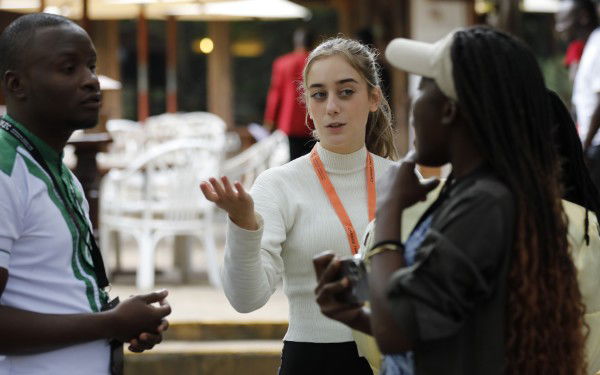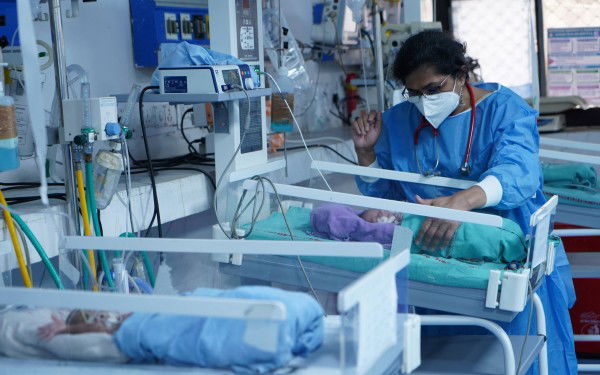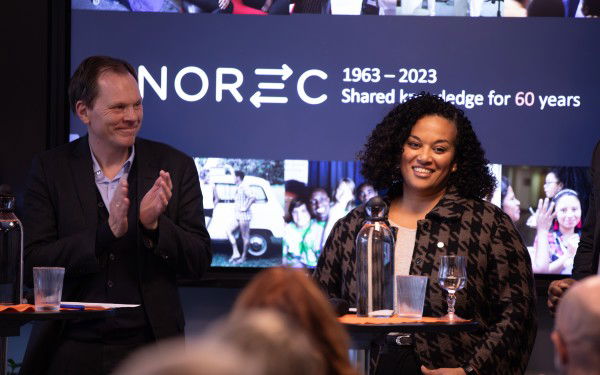Sustainable playgrounds, organic farming and clean rivers
13. June 2022
– People are becoming more conscious about how they handle waste, and they bring these thoughts back to their own communities
JANUARY 2020: Saturday morning in Hoi An, Vietnam. 40 people have gathered on the banks of Thu Bon River, as they do every Saturday- “River Cleaning Day”. In kayaks, wearing gloves and using spades, they reduce the amount of plastic in the river – bag by bag.
– Through campaigns, awareness-raising and the very cleaning itself, people have become much more conscious about the harm caused by waste to the river. After all, we have been living off it for thousands of years. Now, time has come to replace what we have been wearing and tearing, says Minh, Coordinator for ACCD.
Action Center for City Development (ACCD) was established in 2006 in Hanoi. At the time, its goal was to advocate for a more sustainable lifestyle in Vietnamese cities. Food-hygiene, challenges regarding traffic and sustainable playgrounds were at the top of the agenda.
In 2018, they started an exchange-cooperation with Udaudo Nepal and are now into their third round. Each of the two organizations send four participants. All eight of them will spend the first three months in Vietnam, followed by three in Nepal.
The exchange has made the organizations able to implement new projects on river-cleaning and organic farming, which they could not have done without the participants. -This means that we always have eight dedicated people at our disposal, all of them bringing new ideas to our projects, Minh says.
Organic agriculture benefitting the Earth and the wallet.
Huy Ông was a participant in the second round in 2019. The original purpose was to learn more about how to do fundraising, but this changed when he came to Nepal.
– I was very much inspired by how the Nepalese use the nature in activity-based tourism. Despite poorly developed internet and few technical skills, they used storytelling in a way which attracted tourists. I took those skills to Vietnam and adapted it to our context, says Huy.
The middle of Hoi An is straddled with small fields, where each farmer has a about 0,2 acres of land, given to him by the state free for a period of 50 years. By using an optimal match of different types of crops, the farmers can get a max output meaning several crops per year.
ACCD is cooperating with 10 farmers in Hoi An to make their farming organic. Pesticides have been replaced by putting garlic and other strong scents on the crops to keep insects away.
Before, we would make 800 USD per year, whereas now, we make 350 USD per month. Organic farming means more work for us, but it is also more rewarding giving increased income, more demand and increased environmental sustainability, says Ms Nam.
In recent years, there has been a steady decrease regarding people employed in agriculture, and it is particularly difficult to convince young people to work on farms.
– It hasn’t been very rewarding in terms of money to do farming in Vietnam. We are trying to change that by giving the farmers alternative sources of income, in addition to the organic aspect, Huy says.
Together with other volunteers, he has now made it possible for tourists to visit the farms. A new website combined with digital marketing has made this quite popular, and 80 per cent of the income raised from it goes directly to the farmers.
– It is easier to get young people back into farming if they see that they can make a profit. This example is also something our Nepalese participants have brought back to their communities.
Important source of recruitment.
By the banks of the river, the 40 volunteers are done for the day. Big trucks deliver the plastic they have collected to big resorts for further treatment. ACCD show the results of their “plastic harvest” online, to get more sponsors and volunteers.
– We’re still not at a level where we can see concrete results of the work, but people are becoming more conscious about how they handle waste, and they bring these thoughts back to their own communities. More and more of us are focused on how we handle waste these days, and I think we will see improvement over time. Changes start from below, and if everybody do their bit, we will get there, Minh explains.
The eight participants have just started their three months in Vietnam. Minh underscores that recruitment of the right people is key to have the best possible results of the exchange:
– The participants really get to know one another. They live and work together for six months in two different countries, and they experience a lot of personal growth during that time. They go back to their home countries with greater cultural competence, less prejudice and important international experience, Minh says.
– We spend a lot of time finding the right participants. We have many applicants, but we choose those who really wants to learn and contribute to change in their own communities, when they have finished their exchange, Minh concludes.
SEPTEMBER 2020: Then the corona pandemic changed everything. The participants could only stay in Vietnam for a month, before they had to return to Nepal. All exchanges have been postponed for an indefinite time, but they are still working on parts of the projects.
– The farmers are still doing organic farming, but tourist visits to the farms are not possible at the moment. We kept the river cleaning events going until July, but then social distancing stopped that as well. But as soon as the world opens again, we are ready to continue, Huy says.
Viktig rekruttering
Ved elvebredden er dei 40 frivillige ferdige med dagens ryddeøkt. Store lastebilar leverer avfallet til dei store hotellkjedene, som ACCD samarbeider med. Resultatet av ryddinga viser dei fram på ei eiga nettside, for å få inn sponsorar og fleire frivillige.
– Førebels er vi ikkje på eit nivå der vi ser resultatet av arbeidet. Men ryddinga gjer at fleire vert bevisste på avfallshandtering, som dei igjen tek med seg tilbake til sine lokalsamfunn. Vi vert fleire og fleire som jobbar med dette, og eg trur at vi vil sjå betring på sikt. Endring startar nedanfrå, og når alle gjer litt, oppnår vi resultat, fortel Minh.
Dei åtte deltakarane har nettopp starta på sine tre månader i Vietnam. Minh understrekar viktigheita av god rekruttering for å få størst mogeleg nytte av utvekslinga.
– Deltakarane blir svært godt kjende med kvarandre. Dei bur og lever saman i seks månader i to land, og veks mykje på det halvåret. Dei reiser tilbake til sine heimland med større kulturforståing, færre fordommar og viktig internasjonal erfaring, fortel Minh.
– Vi bruker lang tid på å finne dei riktige deltakarane i prosjektet. Mange har lyst, men vi vel personar som oppriktig ønsker å lære og å bidra når dei kjem tilbake etter endt utveksling. Personar som ønsker å bidra til endring i sine lokalsamfunn, seier Minh.
SEPTEMBER 2020: Så endra koronapandemien alt. Dei åtte deltakarane fekk kunne vere i Vietnam i ein månad, før pandemien sende dei tilbake til Nepal. Utvekslingar er førebels utsett på ubestemt tid, men dei jobbar framleis med delar av prosjekta.
– Bøndene driv framleis med organisk landbruk, men det er ikkje mogeleg å gjennomføre turistbesøk på gardane. Elveryddinga hadde vi i gang fram til juli, men så sette kravet om sosial distansering ein stoppar for arrangementa. Men planen er å starte opp igjen når verda opnar opp, fortel Huy.




